


Donate Now
and become
Forum Supporter.

Many perks!
<...more...>


|

11-10-2007, 05:25 PM
|
|
Senior Member
|
|
Join Date: Sep 2006
Zone: 5a
Posts: 9,277
|
|
 Affect of artificial light on Orchids
Affect of artificial light on Orchids
I have my opinion (that I care not to express right now  ) but I am interested in observations of amount of light from artificial sources vs natural sunlight. In other words, we all know some orchids want "full sunlight" but isn't that during the middle of the day  . If I were to supply 2500 foot-candles light (not a huge amount) from lights for a constant 12 hours or more, would that equate to something higher (like 3500) for a short time?  So I am interested in a discussion on personal observations (not Google) related to how folks grow their 'chids and if under lights, what observations they've seen. |

11-10-2007, 05:48 PM
|
|
Senior Member
|
|
Join Date: Jun 2007
Zone: 4a
Posts: 2,678
|
|
Hi Ross,
I too am interested in this lighting subject. I've been looking in the new LED grow lights. The 'hype' on them is great now if someone is actually using them I'd like to hear their experiences.
|

11-27-2007, 06:25 PM
|
|
Senior Member
|
|
Join Date: Sep 2007
Posts: 286
|
|

To keep people from thinking I'm crazy... I'm a moderator on a forum, about lighting... so I have some very strong, and scientific opinions, so don't take me too seriously, but I can answer most any lighting question... I hope that doesn't sound too pretentious, but I love to help/talk about lighting, so here goes!
well, LEDs are a bad source of light (in the plant growing circumstances)
The benefits of LEDs:
Small size, almost ideal point source of light (excellent optics).
Extremely fast turn on/off time, also can dim with Pulse Width Modulation (great for signs and brake lights)
The problems with LEDs are:
Increased Complexity, current based source similar to HIDs with complex negative thermal coefficient (resistance drops as temperature increases). To efficiently drive a LED source you need a switching current based regulator. Linear regulators like the LM317 and 7805/12 etc... AND Resistors are all very energy inefficient, exacerbating the inefficiency of LEDS further.
Lumens Per watt is BARELY better than Halogen, and 5mm and 3mm are NOT better, only some of the latest Luxeons beat Halogens which are the WORST! This means they are a waste of heat, very inefficient. LEDs are in the 20-30 Lumens per watt for the old school Luxeons, and 40-50 in the new K2 Luxeons... For reference see picture below:
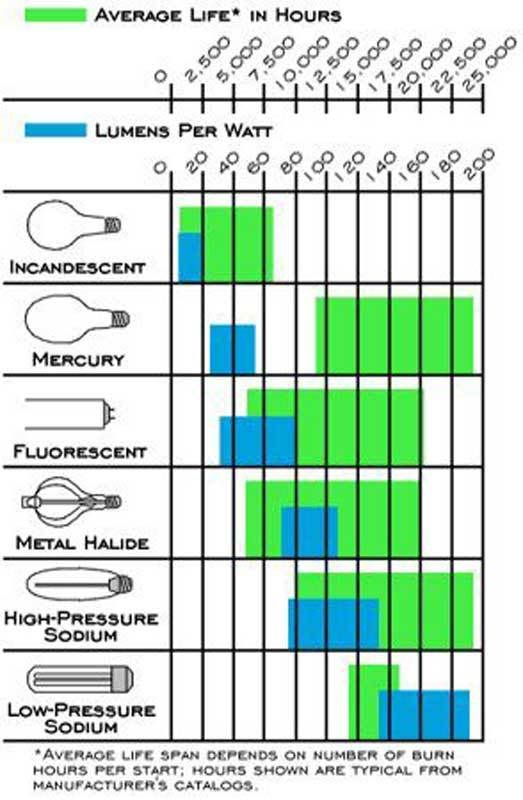
Last edited by Ocelaris; 11-28-2007 at 01:08 AM..
|

11-27-2007, 06:43 PM
|
|
Senior Member
|
|
Join Date: Sep 2007
Posts: 286
|
|

The information you seek is wide and varied... to briefly summarize:
The light you want is one with a high "Photosynthetic Active Radiation" or PAR rating. Of course, that isn't a spec that they rate on, ever. BUT what you do usually get on the bulb, is Color Temperature and Color Rendering Index.
Color Temperature is the relative warmth or Coldness...
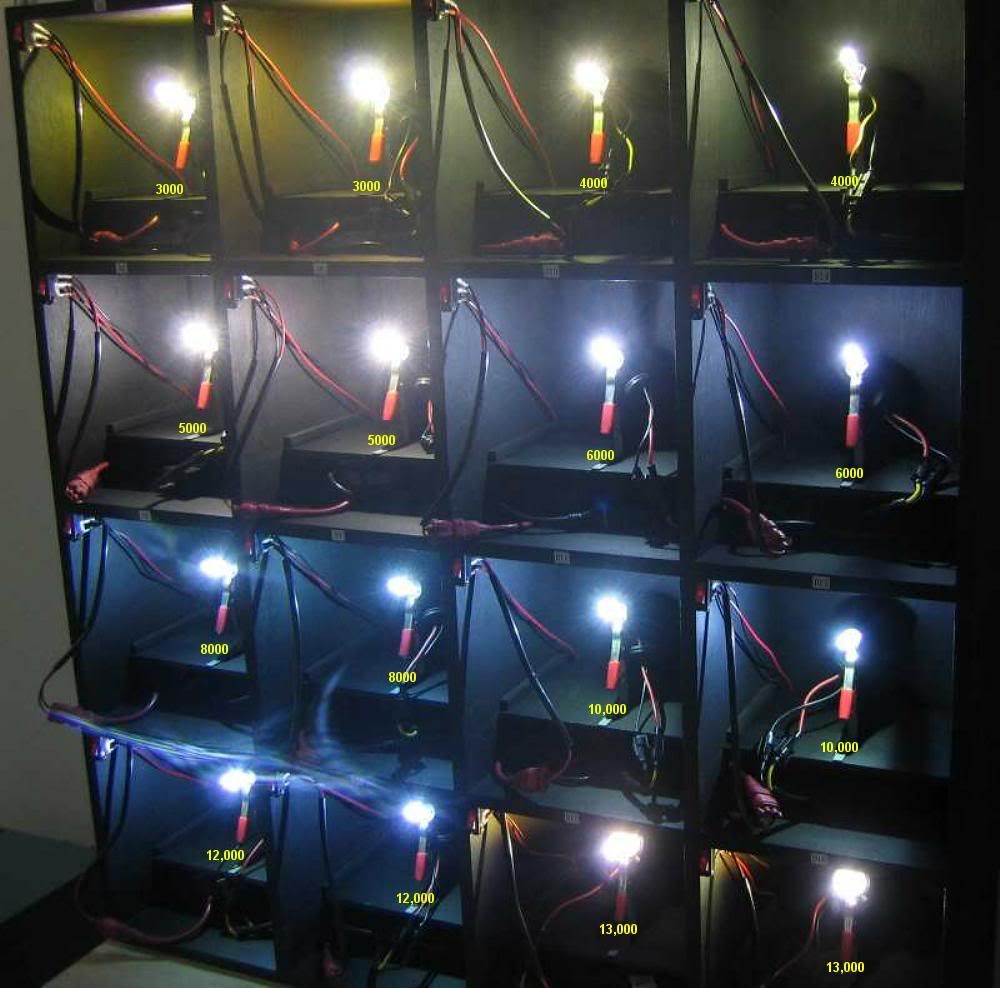
Red is around 3000 degress Kelvin, Blue is anything above 6000k roughly, most would agree that about 4000k is a comfortable light for the home.
The other rating that you can meausre on, and is given on the bulb, is Color Rendering Index, and that is rated 0-100% basically how acurately all the colors are rendered... any bulb with a filament has a 100% CRI, flourescent, Metal Halide, and LED do not, but some are better than others.
Here are two examples of CRI

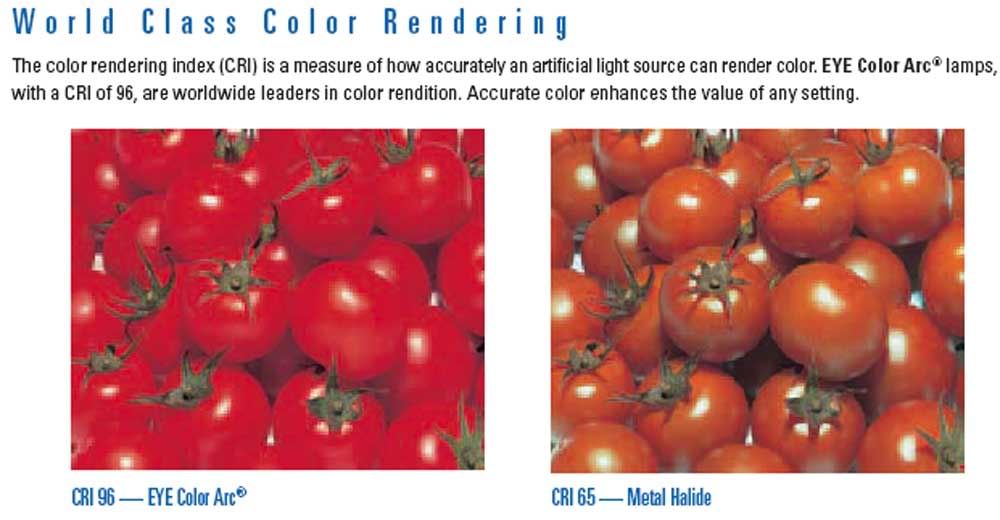
The reason that non filament lighting sources do not get a 100% CRI rating, is that they are made up of specific salts, which "burn" at different specific colors, they add all these colors up and get something approximating "white" light. This can be good or bad for plants, mainly that you can emphasize the photosynthetic active radiation parts, and ignore the part which is not useful, like green which is reflected in plants (hence the green leaves) Here are two pics to explain the non-linear spectral emissions of non-filament bulbs:
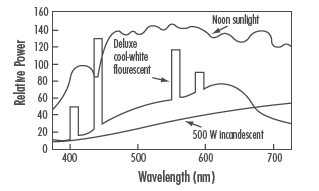
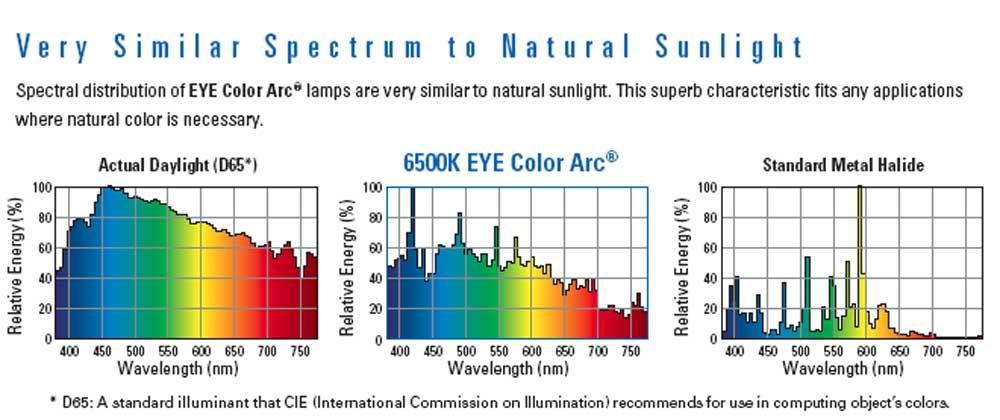
Although it seems we would want a filament bulb because it has a linear spectrum (all color equal) unfortunately filament bulbs are very wasteful.
Summary:
Basically, a 3000k-5000k bulb that has a high CRI rating (80+) is what will do well for plants.
I have a 100w 4000k 90CRI bulb for my vandas and high light plants, and some 3500k 80 CRI bulbs for my other paphs etc...
You need not spend a lot on lights to get great plant lights, just know where to search, and have a little electrician in you to build a nice setup. I'd be happy to share.
Last edited by Ocelaris; 11-28-2007 at 01:11 AM..
|

11-28-2007, 02:34 PM
|
|
Senior Member
|
|
Join Date: Aug 2007
Location: Rockford, IL
Posts: 127
|
|
You need not spend a lot on lights to get great plant lights, just know where to search, and have a little electrician in you to build a nice setup. I'd be happy to share.[/QUOTE]
Ocelaris...Thank you for all that info! I grow under T8, T5 and MH/HPS fixtures, so in your opinion, what would be the recommended bulbs/tubes to get the most from the fixtures that I have? John
|

11-28-2007, 09:29 PM
|
|
Senior Member
|
|
Join Date: Sep 2007
Posts: 286
|
|

My reccomendation to anyone trying to get the most, is to learn and try. Educate yourself on the specs, and then try different tubes around the house to see if YOU like the bulb, and how it looks, and then if you like it, try it for your plants. I'm all about ME first here, I find any old bulb works about the same, it's about quantity as long as the quality isn't horrible. More light, less bucks, rather than expensive "plant specific" lighting. Not that horticultural bulbs aren't great, they are better, but if you're on a budget as we alway s are, and when you have to finance that lighting "upgrade" on milk money, it is fun to toy with various cheap bulbs to see how things do!
well... MH/HPS can be slightly limited, but it depends on what wattage you are running? like MH can run in 30-1000w and depending on what bulb shape, typically it's all the same shape for the size... but also if you have a magnetic (core and coil ballast) or an electronic ballast it matters. For example you can't run ceramic metal halides on electronic ballasts usually... they go POP!
HPS bulbs you usually need to get horticultural bulbs because they are so poor in spectrum they need to be supplemented with blue.
T-8 check out this spec sheet for the USHIO manufacturer:
They have anything between 3000k and 6000k between 80 CRI and 95 CRI And you have a lumen output. I just use Ushio as an example because they have a wide variety of bulbs, T-8, T-5, T-12, MH/HPS etc... and very good with specs, and a smaller company compared to Philips or Osram which have thousands of bulbs...
Just check out the various specs, anything in between 4000-5000k is pleasant to look at, and 80+ CRI is great... 90+ is awesome... On the PDF they even have graphs of the output peaks if you want to get crazy, but it would be hard to guesstimate the PAR active energy, and it's been my opinion that 4000k bulbs work just fine for all around growing. HPS is just ugly to look at, although extremely efficient, so you get a bit more bang for your buck with HPS, I have my dad a little 250w HPS bulb I made out of an old down light, he keeps his geraniums etc... healthy during the winter.
Once you find the bulb you like, then you can shop around online or locally if it's a long bulb (4 feet + are expensive to ship). Bulbster.com carries UShio bulbs, and there are others around.
Find your bulb, then shop for a price.
Some other bulb manufacturers:
Philips is a major manufacturer, and they have an excellent catalog, just click "catalouge" on the page, and you can browse all their bulbs... it may be difficult at first, that's why I reccomend the Ushio site first, as it's compact, easy to find your way thorugh and great info right at hand.
The global light site
Osram is another major lighting manufacturer, web page is shite though:
OSRAM|index
GE is the 3rd great Lighting manufacturer, at least in the US, and their site is decent.
GELighting.com Global Splash Page
Iwasaki or "EYE Lighting" is probably my favorite, the absolute best 250w metal halide bulb for growing is their 6500k Metal Halide bulb... They make some awesome smaller bulbs with high CRI and ~4000k color temperature...
EYE Lighting International of North America, Inc.
http://www.ushio.com/files/specs/Ultra8T8UBend.pdf
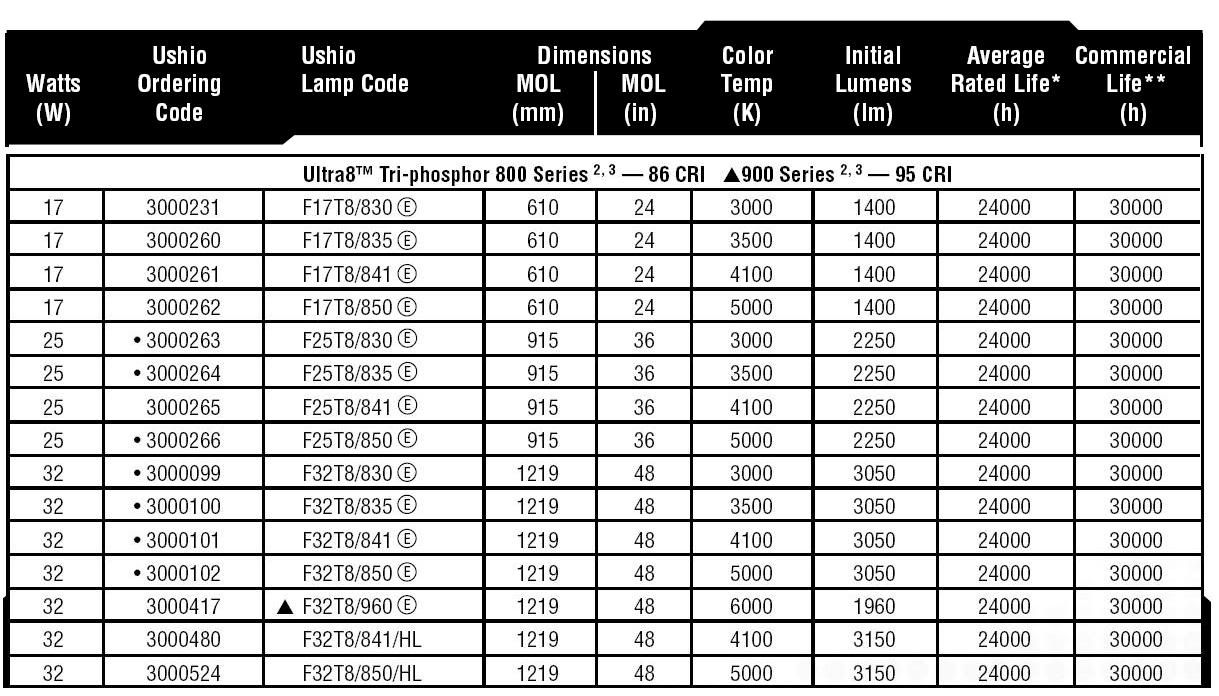
Last edited by Ocelaris; 11-28-2007 at 09:35 PM..
|

11-28-2007, 09:30 PM
|
|
Senior Member
|
|
Join Date: Sep 2007
Posts: 286
|
|
Here is the best article on Photosynthenic Active Radiation I would highly reccomend. It's really just metal halide, but worth the read. It's tailored for Coral Reef people, but the PAR rating is informative.
Aqua Botanic-light bulb comparison |

11-29-2007, 12:37 AM
|
|
Senior Member
|
|
Join Date: Nov 2007
Zone: 3a
Location: winnipeg
Posts: 2,013
|
|
 lumens, pars. lux
lumens, pars. lux
it,s all latin to me
or am i just not verry smart 
the more i read the confuseter i got |

11-29-2007, 10:48 AM
|
|
Member
|
|
Join Date: Jan 2007
Zone: 10a
Location: So. Cal
Posts: 86
|
|
Simple, just get two 2 tube 4 foot long shoplites from home depot/lowes and hang about 4-8 inches above plants. This is about 160 watts. a combo of warm and cool lights bulbs is fine. Total cost about $30.
You can grow a wide variety of orchids. Flat growing plants are the easiest like phal's and paphs. Tall ones more difficult.
This is adequate even to bloom mini cattleyas.
|

11-29-2007, 11:35 AM
|
|
Senior Member
|
|
Join Date: Sep 2007
Posts: 286
|
|
Quote:
Originally Posted by snow

it,s all latin to me
or am i just not verry smart 
the more i read the confuseter i got |
Try this site, it's my favorite about light:
handprint : light and the eye

To me, it's a journey and it all ends up being useful at some point or another even if it seems over kill at the moment. It's all the level of interest that sustains you, if you're way into it, there should be more than enough that I've collected over the years and posted to keep people busy reading!
But like minicat said, 2 shop lights, with a total of 4 bulbs that suit your tastes visually will do well for growing just about any typical orchid. My sister does it exactly this way, she has good results and she has no interest in any further lights, even though I've offered to the point of exhaustion 
With that said, you can achieve stronger growth, and more light demanding plants with different configurations, some of the more complicated bulbs. It's just my cup o' tea  |
|
Currently Active Users Viewing This Thread: 1 (0 members and 1 guests)
|
|
|
 Posting Rules
Posting Rules
|
You may not post new threads
You may not post replies
You may not post attachments
You may not edit your posts
HTML code is Off
|
|
|
All times are GMT -4. The time now is 10:50 PM.
|




















 ) but I am interested in observations of amount of light from artificial sources vs natural sunlight. In other words, we all know some orchids want "full sunlight" but isn't that during the middle of the day
) but I am interested in observations of amount of light from artificial sources vs natural sunlight. In other words, we all know some orchids want "full sunlight" but isn't that during the middle of the day  . If I were to supply 2500 foot-candles light (not a huge amount) from lights for a constant 12 hours or more, would that equate to something higher (like 3500) for a short time?
. If I were to supply 2500 foot-candles light (not a huge amount) from lights for a constant 12 hours or more, would that equate to something higher (like 3500) for a short time?  So I am interested in a discussion on personal observations (not Google) related to how folks grow their 'chids and if under lights, what observations they've seen.
So I am interested in a discussion on personal observations (not Google) related to how folks grow their 'chids and if under lights, what observations they've seen.

















 Linear Mode
Linear Mode


